

Efforts to combat fake news aren’t working, Facebook admits. Britishmedia(1) Americanmedia(1) La presse. You Won’t Believe What Obama Says In This Video! .mp4. AI generated real fake video of Barack Obama (1) Script video 2mn21 deep fake news Obama and explanation. Vocab image LIE. What fake news is. FAKE NEWS. FAKE NEWS. Schools, Universities Teach Students the Truth About Fake News - Text + Audio - 15 April 2017 "Education programs, from universities to secondary schools, are trying to train students to understand fake news and the difference between quality and poor journalism.
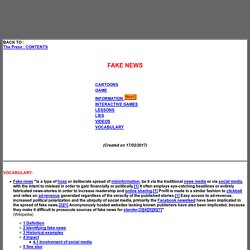
" Problématique. Lesson 1 analyse de l'image. SCRIPT video 1mn12 you won't believe what obama says. Social media. BBC Learning English - Course: Fake News: Fact and Fiction / Unit 1 / Session 3 / Activity 1. BBC Learning English - Course: Fake News: Fact and Fiction / Unit 1 / Session 2 / Activity 1.
200520 fake news ep2. Citizenship and virtual world. « Fred se méfie des fausses infos » : une BD pour apprendre à vérifier l’information. Le Monde et des tiers selectionnés, notamment des partenaires publicitaires, utilisent des cookies ou des technologies similaires. Les cookies nous permettent d’accéder à, d’analyser et de stocker des informations telles que les caractéristiques de votre terminal ainsi que certaines données personnelles (par exemple : adresses IP, données de navigation, d’utilisation ou de géolocalisation, identifiants uniques).
Ces données sont traitées aux fins suivantes : analyse et amélioration de l’expérience utilisateur et/ou de notre offre de contenus, produits et services, mesure et analyse d’audience, interaction avec les réseaux sociaux, affichage de publicités et contenus personnalisés, mesure de performance et d’attractivité des publicités et du contenu. Pour plus d’information, consulter notre politique de confidentialité. Word of the Year 2016 - Oxford Dictionaries. The Papers. "Quarantine farce as Italian planes fly in" is the headline on the front of the Daily Telegraph.
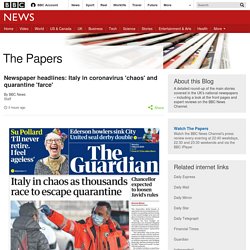
The paper reports that although 16 million people were put into lockdown, "dozens" of flights were allowed to arrive in the UK and passengers were not put into quarantine. It adds that ministers are reportedly coming under pressure to follow France and Germany and cancel mass gatherings of more than 1,000 people. But a government source is quoted as saying that British ministers are reluctant to act - with the view that EU nations are shutting down events for political reasons rather than scientific ones.
The government's response to the Italian lockdown is criticised in the Guardian. The paper reports that "hours after" the plan was put in place, the Foreign Office was still advising that it was safe to travel to anywhere apart from the initial 11 towns that were quarantined. Wb new meeting point 1re Didier. Wb new meeting point 1re Didier. Wb new meeting point 1re Didier. Wb new meeting point 1re Didier. Quizlet fake news. ELLLO Views #41 News Source. Primarily In Canada I got my news from primarily watching television.
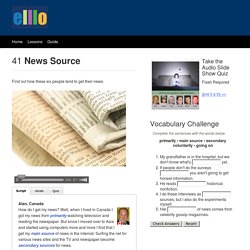
The word 'primarily' has the same meaning as 'mainly'. The two words are interchangeable. Notice the following: elllo has many activities, but it's primarily a listening site. elllo has many activities, but it's mainly a listening site. main source My main source of news is the internet. Our 'main source' is the source we use most often to get something we want. Vidéos du Manuel : Anglais 1re.
Lelivrescolaire.fr. Fake news lesson plan. Critical thinking is a key skill in media and information literacy, and the mission of libraries is to educate and advocate its importance. Discussions about fake news has led to a new focus on media literacy more broadly, and the role of libraries and other education institutions in providing this. When Oxford Dictionaries announced post-truth was Word of the Year 2016, we as librarians realise action is needed to educate and advocate for critical thinking – a crucial skill when navigating the information society. IFLA has made this infographic with eight simple steps (based on FactCheck.org’s 2016 article How to Spot Fake News) to discover the verifiability of a given news-piece in front of you.
Download, print, translate, and share – at home, at your library, in your local community, and on social media networks. The more we crowdsource our wisdom, the wiser the world becomes. Download the infographic. Good Tools for Teaching Students How to Evaluate Web Content Credibility. Source: Butler University Library, adapted from Meriam Library at CSU, Chico One of my favorite lessons to teach is about evaluating the credibility of web sites and other digital content.
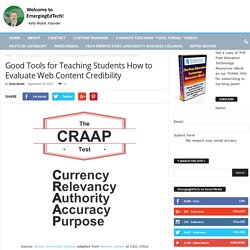
I often start by showing the classic “Can't Lie On The Internet” video from AllState, which gets a laugh and helps to get students in the right mind set. Next, we check out the classic “DHMO” site and talk about what we see there. Dihydrogen Monoxide sounds pretty scary, but is this site legitimate? That's when I bring up Kathy Schrock's 5 W's PDF and use it as a kick off point to discuss the idea of using criteria for evaluation, not just gut reactions.
Another tool I came across recently that I like is this 60 Second Guide for evaluating web resources. There are countless resources on the web for evaluating content credibility, and it is easy to get a bit overwhelmed. The Challenges of Video and Social Media Credibility. Lesson Plan: How to Spot Fake News. The problem of fake news came to a dizzying head in 2016 when a man fired a shot in a family pizzeria as he “self-investigated” a false report of a child abuse ring led by top democrats.
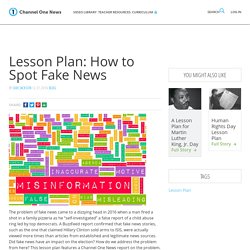
In the war on fake news, school librarians have a huge role to play. Post-Truth and Fake News. Earlier in the year I was tasked with creating a resource guide on “post-truth” and fake news.
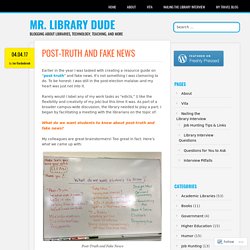
It’s not something I was clamoring to do. To be honest: I was still in the post-election malaise–and my heart was just not into it. Rarely would I label any of my work tasks as “edicts,” (I like the flexibility and creativity of my job) but this time it was. As part of a broader campus-wide discussion, the library needed to play a part. I began by facilitating a meeting with the librarians on the topic of: Analysing newspapers.